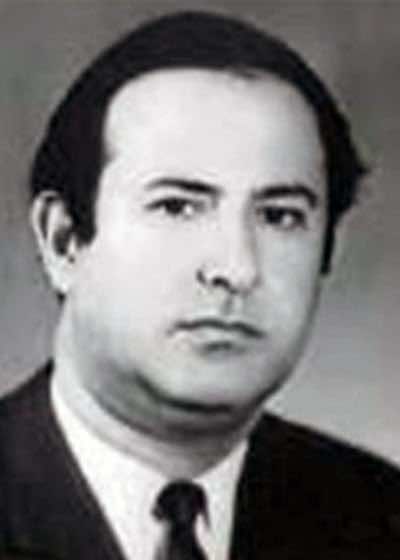Renowned fabulist, poet-translator Hikmat Ziya
 Honored Artist, renowned poet, and fable writer Afandiyev Hikmat Ziya oghlu was born in Shaki on May 13, 1929. His father, Ziya Afandiyev, worked as a teacher in Shaki, Zagatala, and Aghdam as a professional educator. His grandfather, Abdulla bey Afandizadeh, was a member of the parliament of the Azerbaijan Democratic Republic and worked as a teacher. His grandfather played a major role in his development as a playwright and poet.
Honored Artist, renowned poet, and fable writer Afandiyev Hikmat Ziya oghlu was born in Shaki on May 13, 1929. His father, Ziya Afandiyev, worked as a teacher in Shaki, Zagatala, and Aghdam as a professional educator. His grandfather, Abdulla bey Afandizadeh, was a member of the parliament of the Azerbaijan Democratic Republic and worked as a teacher. His grandfather played a major role in his development as a playwright and poet.
Hikmat Ziya, who spent his childhood in Karabakh, received his secondary education at Secondary School No. 1 in Aghdam. In 1947, he moved to Baku to pursue higher education and enrolled in the journalism department of the faculty of philology at Azerbaijan State University. After graduating, he was appointed to the editorial office of "Azerbaijan Pioneer" newspaper, where he worked for an extended period (1952-1969) as a copy editor and later as the head of the literature and art department. From 1969 to 1984, he was the head of the poetry department and executive secretary at the editorial office of the "Goyarchin" magazine. He was also a member of the advisory panel of the satirical film magazine "Mozalan," the All-Union Council of Children's and Youth Literature, and the editorial boards of the newspaper "Azerbaijan Pioneer" and magazine "Literary Azerbaijan".
He began his literary career in 1952 by publishing his first poem titled "To Gogol" in the newspaper "Azerbaijan Pioneer." His initial satirical poems, alongside the books "My Father's Gift" (1957), "Is Spring Beautiful or Winter?" (1959), and "The Heart of a Fly" (1960), were also published. His poems are distinguished by their relevance, naturalness, and sincerity. He earned recognition as a children's poet by promoting justice, bravery, friendship, and honesty in his poems for children.
With over three thousand fables to his name, Hikmat Ziya uniquely and concisely reflected the flaws and shortcomings of our lives and society in his works. One of his most significant contributions to Azerbaijani literature is his emphasis on maximum brevity, conciseness, and simplicity within this genre. In his fables, Hikmat Ziya critiques various human traits using animals and inanimate objects, portraying individuals with foxlike cunning, wolfish savagery, cowardly hearts, and bear-like minds. He skillfully addresses pressing societal issues in his fables, condemning those who set forests ablaze, pollute rivers and seas, covet public property, and disrupt the peace while calling for harmony and justice among people.
Hikmat Ziya also made significant contributions to the world of cinema. He was the screenwriter for films such as "Ali Bayramli" (1971), "Azerbaijani Woman" (1974), "Garib in the Land of Jinn" (1977), and "Naughty Rabbit" (1981). His plays "The Trial" and "Twin Brothers" were staged. His librettos ("Grandmother's Tale", "The Adventures of Two", "Pale Flowers") and poems were set to music, and his works were translated into many languages. He accomplished much in the field of translation, including numerous translations of works by the Russian poet A.S. Pushkin and the translation of the "Rustam and Sohrab" epic from Firdowsi's "Shahnameh" into Azerbaijani. The book "The Last Turkic Alphabet," written by Hikmat Ziya, testifies to his scientific and pedagogical knowledge.
Hikmat Ziya was awarded the "Prominent Educator" badge (1978), the honorary decree of the Presidium of the Supreme Soviet of the Republic of Azerbaijan (1988), and the honorary title of Honored Art Worker of the Azerbaijan SSR (1986). The "Hikmat Ziya" literary award was established in his name. Hikmat Ziya, a beloved poet and educator who won the eternal love of readers with his works, died on August 2, 1995, in Baku.
Recommended literature:
- Ziya, Hikmət. Seçilmiş əsərləri / H. Ziya ; tərt. A. Xudiyeva ; red. R. Yusifoğlu ; Azərbaycan Respublikası Mədəniyyət və Turizm Nazirliyi. I cild. - Bakı : Aspoliqraf, 2014. - 464 s.
- Ziya, Hikmət. Şeirlər və təmsillər/Ə. H. Ziya ; red. H. Həsənzadə. - Bakı: Azərnəşr, 1963. – 66 s.
- Ziya, Hikmət. Təmsillər [Gənclər üçün] /Z. Hikmət; red. M. Ələkbərli. - Bakı: Gənclik, 1985. - 139 s.
- Ziya, Hikmət. Mənim misralarım/H. Ziya ; red. M. Seyidzadə. - Bakı: Gənclik, 1975. – 140 s.